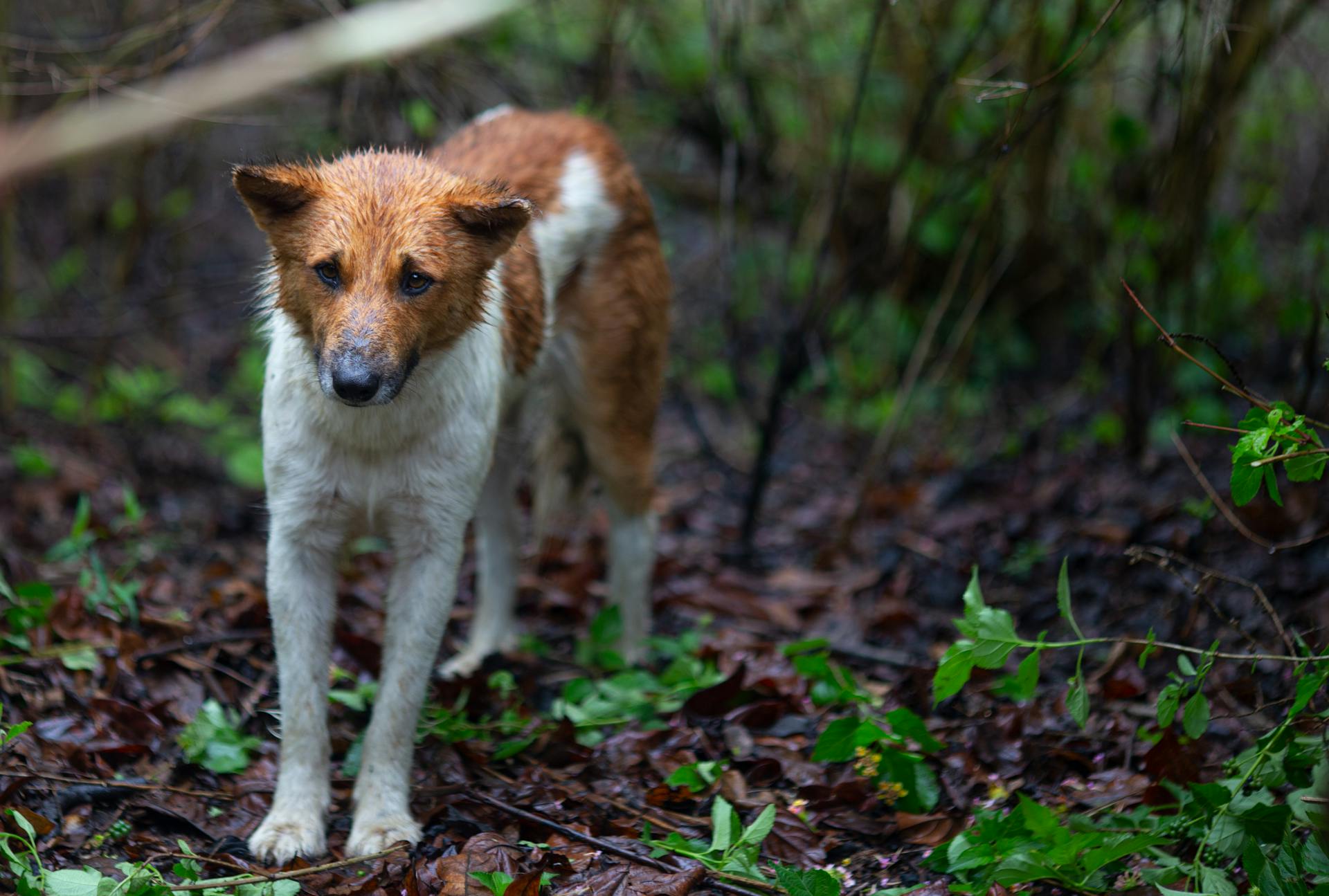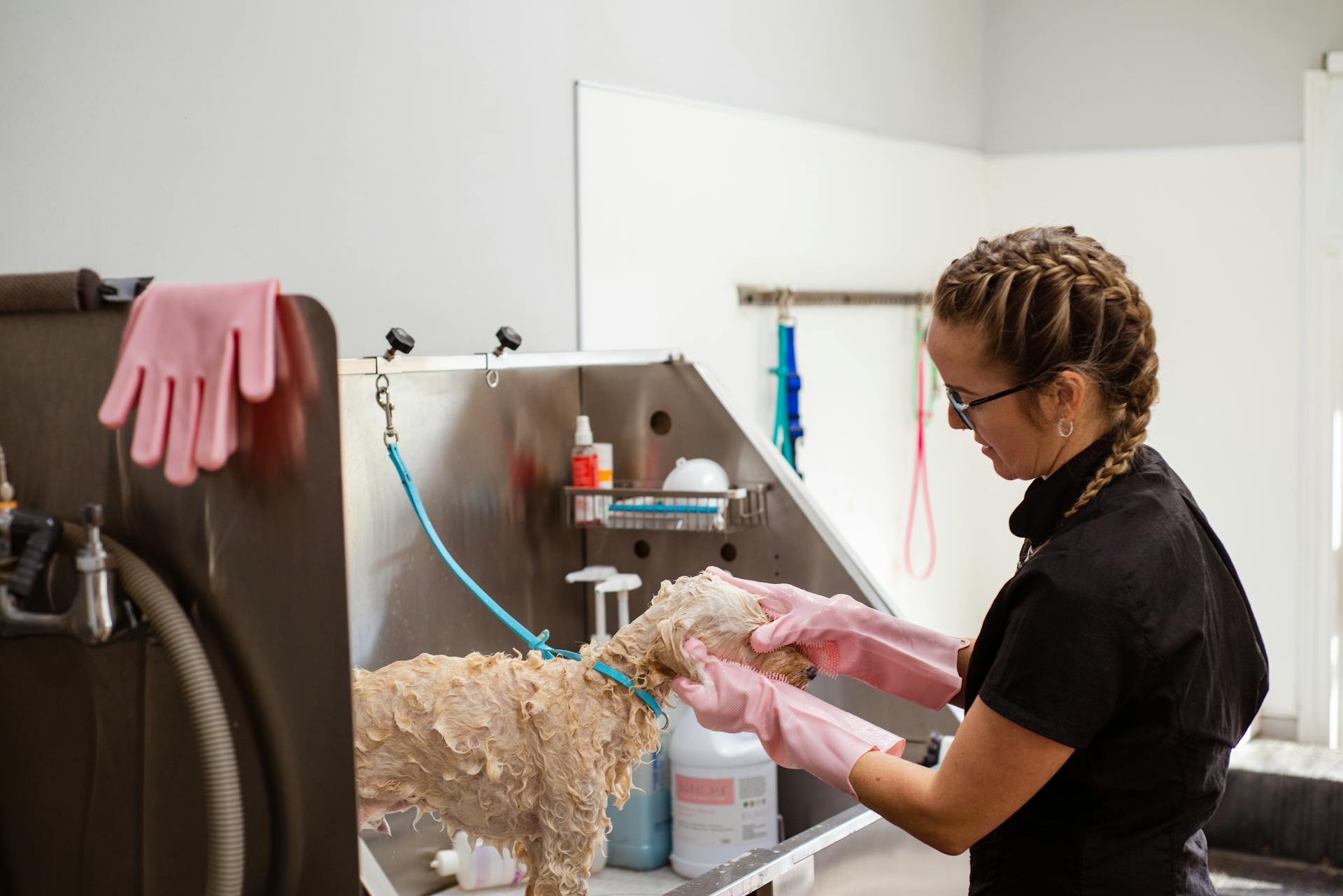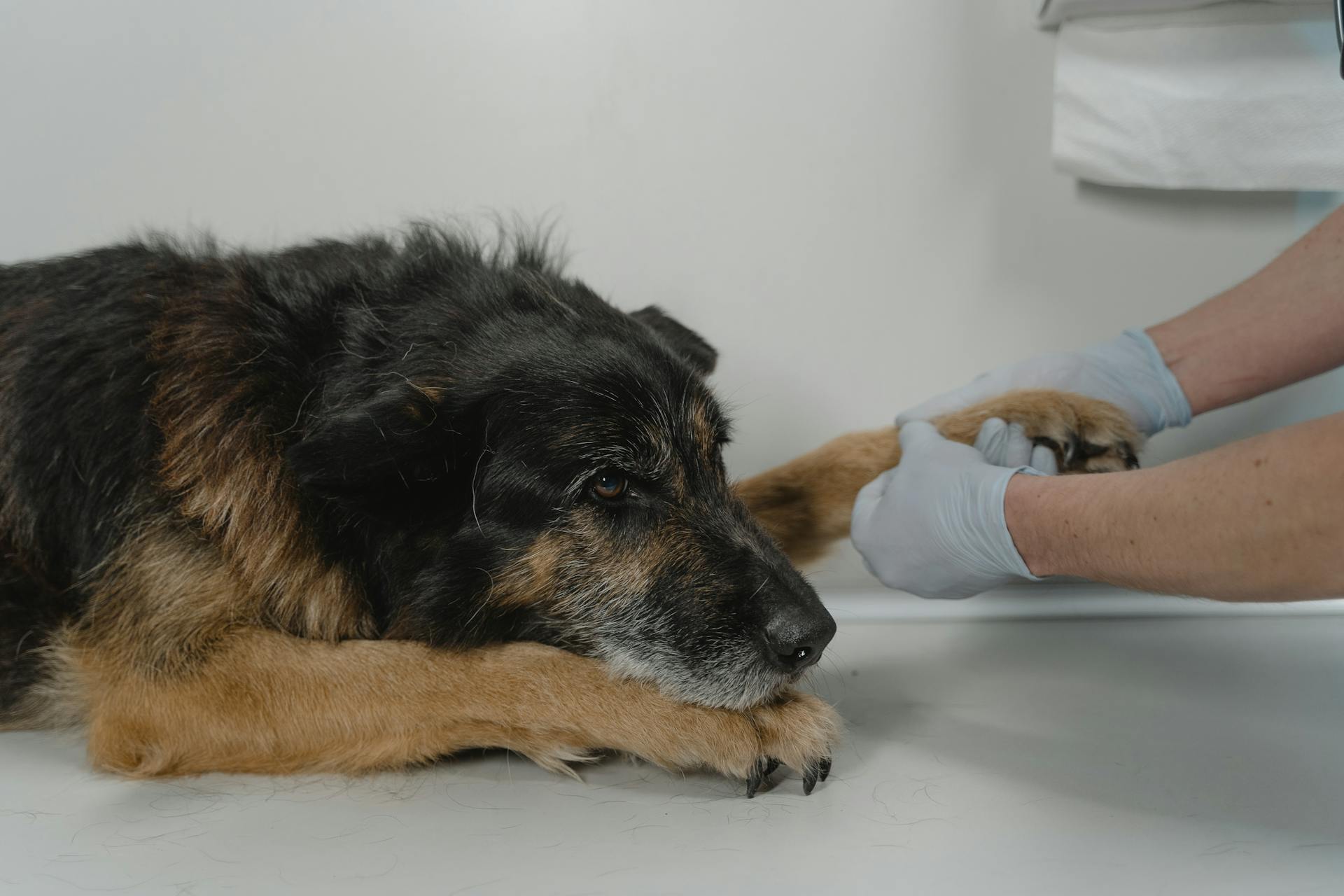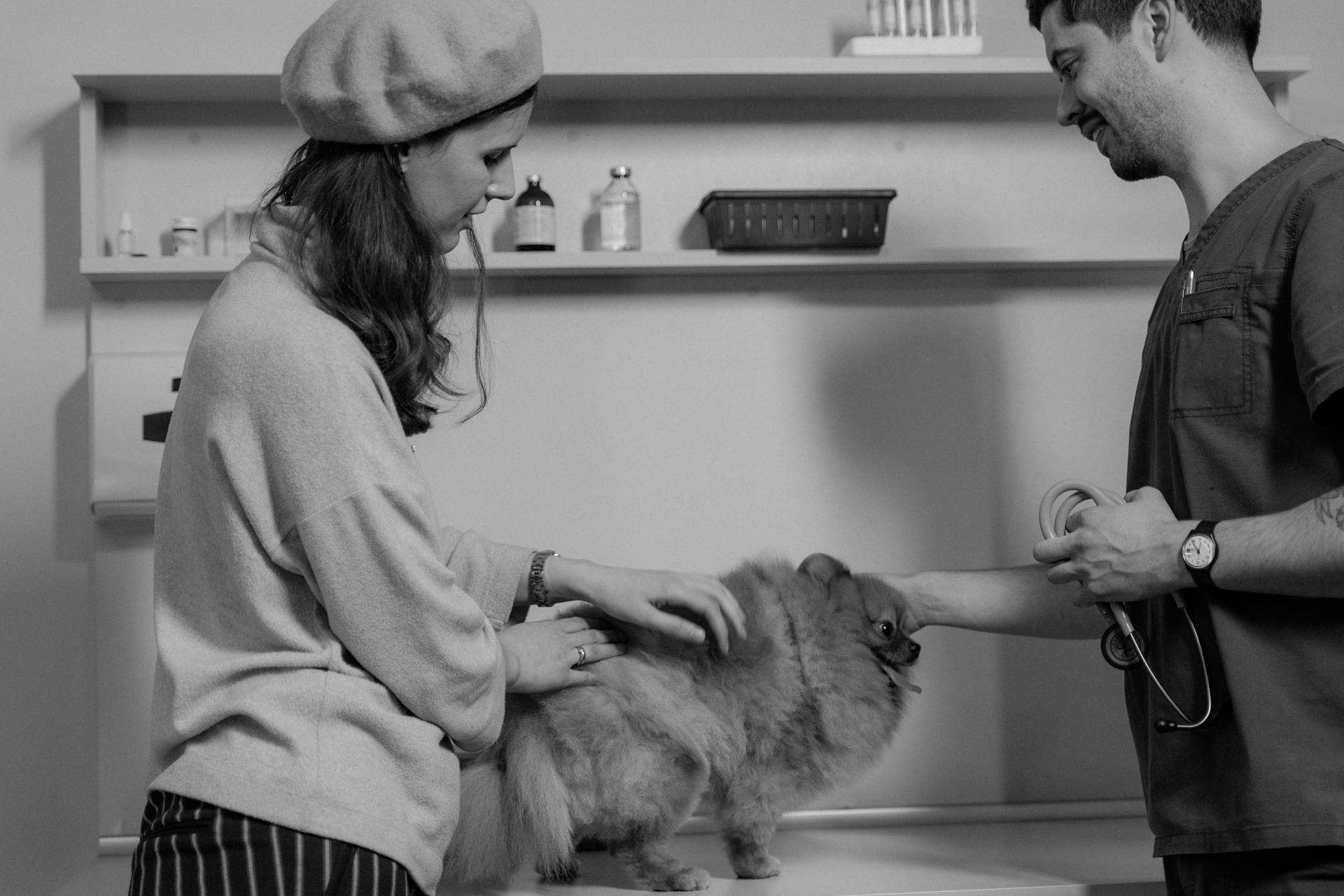
The Africanis is a remarkable dog breed that originated in Africa, and its history dates back thousands of years. It's a testament to the region's rich canine heritage.
This ancient breed was first domesticated in Africa around 15,000 years ago. Its adaptability to the harsh African climate is a key factor in its survival.
The Africanis is a medium-sized dog, typically weighing between 30-60 pounds and standing between 20-24 inches tall at the shoulder. Its short coat requires minimal grooming.
With a lifespan of 12-15 years, the Africanis is a long-term companion that requires a commitment to care and attention.
Worth a look: Indian Stray Dog Breed
Breed History
The Africanis breed has a rich history that spans thousands of years. It's believed to be descended from wild hounds and pariah dogs that lived in ancient Africa.
The breed developed naturally in South Africa with very little human interference, which is why it's considered a primitive breed. This lack of interference has helped preserve its natural characteristics and instincts.
Expand your knowledge: Bully Breed American Bulldog
In 1998, a society dedicated to the conservation of the Africanis breed was created, the Africanis Society, with the goal of conserving and maintaining the breed as it has developed naturally. This society is unique in that its intent is not to perfect the breed but to preserve it in its natural state.
The Africanis has been attached to human settlements in southern Africa for thousands of years, where it was used for tasks such as herding, guarding, and hunting. It's a familiar sight in villages where a traditional South African lifestyle is still maintained.
The breed has been known by many names, including the Kaffer brak, Kasi dog, and Khoekhoe dog, among others. This diversity of names reflects the breed's widespread presence in southern Africa.
The earliest evidence of domestic dogs in South Africa dates back to 570 CE, with remains found near the Botswana border. By 650 CE, the dog was found in the lower Tugela valley, and by 800 CE in a Khoesan settlement at Cape St Francis.
Discover more: South American Dogs
Breed Characteristics
The Africanis breed is known for its athletic and muscular build, with a slender and streamlined physique. They tend to be fairly large dogs.
Their wedge-shaped head is similar to that of ancient sighthounds, and they have a long, cone-shaped muzzle. Their medium-sized, V-shaped ears can be carried erect, semi-erect, or may droop.
Their oval-shaped eyes come in any shade, and their short, easy-to-manage coats are double-layered and can come in any color or combination of colors. White, black, brown, and tan are most common colors.
The Africanis is a medium-sized dog, with a height range of 50 to 62 centimeters (20 to 24 inches). They are lightly built and have a long slender muzzle.
Their short coat requires minimal grooming, and they are known to breed true to a recognizable form. This means that they tend to maintain their unique characteristics despite minor variations.
The Africanis is a friendly but cautious breed, requiring some space and physical distance to feel comfortable. They can become uncomfortable if pushed for physical contact.
They are highly intelligent and eager to please, making them easily trainable with positive training methods. They are also patient and gentle with children, making them a great breed for families.
Worth a look: Ridgeback Dog Colors
Breed Care
The Africanis needs regular grooming to stay healthy and happy. They require weekly brushing with a slicker or gentle bristle brush to remove loose hair and keep their coat shiny.
You should also wipe them down with a wet washcloth to keep their coat healthy.
Their ears need to be checked regularly to ensure they're clean, dry, and free of debris or infection.
What's the Best Diet?
When it comes to feeding your Africanis, you'll want to focus on a high-quality diet with protein as the main ingredient. This is especially important since they're an energetic and athletic breed.
Africanis are used to a low-quality diet historically, but that doesn't mean you should follow suit. Look for food formulated for medium to large dogs.
Puppies should be fed up to four meals a day, which can be reduced to two meals once they're adults. This will help them grow strong and healthy.
You can also give them treats, especially during training, but be sure to account for these extra calories when serving their main meals.
Breed Maintenance

The Africanis breed requires regular maintenance to keep them happy and healthy. They need to be brushed every week or so with a slicker or gentle bristle brush.
Their coat is relatively low-maintenance, requiring only an occasional bath when necessary, as excessive bathing can strip their coat of natural oils.
Regular ear checks are a must to ensure their ears are clean, dry, and free of debris or infection.
Trimming their nails and brushing their teeth regularly are also essential for their overall health.
Africanis dogs are high-energy breeds that require at least an hour to an hour and a half of vigorous exercise per day to keep them happy and satisfied.
Health Risks
The Africanis is generally a very healthy breed due to their natural immunity to parasites developed from living in difficult environments.
They can be susceptible to diseases like distemper, parvovirus, and rabies.
Entropion or ectropion, eye conditions, may occasionally be diagnosed.
Africanis owners should be aware of these potential health risks and take necessary precautions to prevent them.
Similar Breeds
If you're looking for breeds similar to the Africanis, you might want to consider the Basenji. The Basenji is an ancient breed that, like the Africanis, is known for its unique yodeling howl.
The Basenji is a smaller breed than the Africanis, weighing between 24-38 pounds, but they share similar energetic and athletic characteristics.
The Pharaoh Hound is another breed that shares some similarities with the Africanis. This breed is known for its short, smooth coat and athletic build.
The Pharaoh Hound is an ancient breed, originating from Malta, and like the Africanis, it's a highly intelligent and independent dog.
The Saluki is a sight hound breed that, like the Africanis, is known for its speed and agility.
Consider reading: Mahratta Hound
Dogs
Dogs are an essential part of the Africanis' life, serving as companions and hunting partners.
The Africanis has a strong instinct to chase small game, and dogs have been used to help with this task.
In many Africanis households, dogs are considered part of the family and are often fed and cared for alongside the humans.
Africanis owners often choose breeds that are compatible with their lifestyle and living situation.
The Africanis
The Africanis is an ancient dog breed that originated in Africa. It's believed to be one of the oldest dog breeds in the world, with a history dating back over 4,000 years.
They are a medium-sized dog with a muscular build, typically weighing between 20-40 kg. The Africanis has a short, smooth coat that requires minimal grooming.
Their original purpose was as a hunting companion and guard dog. The Africanis is known for its intelligence, loyalty, and protective nature.
Frequently Asked Questions
How long does an Africanis dog live?
An Africanis dog's average lifespan is up to 12 years, making them a relatively long-lived breed. If you're considering bringing one home, learn more about their health and care requirements.
How to train an Africanis dog?
To train an Africanis dog, establish a trusting relationship through kind and reward-based training methods. This approach fosters obedience and respect without harsh techniques.
Featured Images: pexels.com

